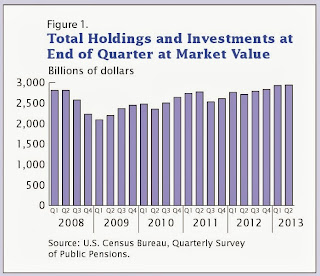Blackstone Sees Epic Credit Bubble?

Lawrence Delevingne of CNBC reports, Blackstone: We're in an 'epic credit bubble' : One of the world's largest investment firms believes the financial system is overly leveraged. "We are in the middle of an epic credit bubble, in my opinion, the likes of which I haven't seen in my career in private equity," Joseph Baratta, The Blackstone Group's global head of private equity, said Thursday night at the Dow Jones Private Equity Analyst Conference in New York City. "The cost of a high yield bond on an absolute coupon basis is as low as it's ever been." Baratta said Blackstone is "bullish" on the U.S. economy, but the "valuations we have to pay relative to the growth prospects are out of whack right now." Baratta said the U.S. still has "clear headwinds" and is "range bound" between 1 percent and 3 percent economic growth. Blackstone, which manages $53 billion in private equity assets ...





